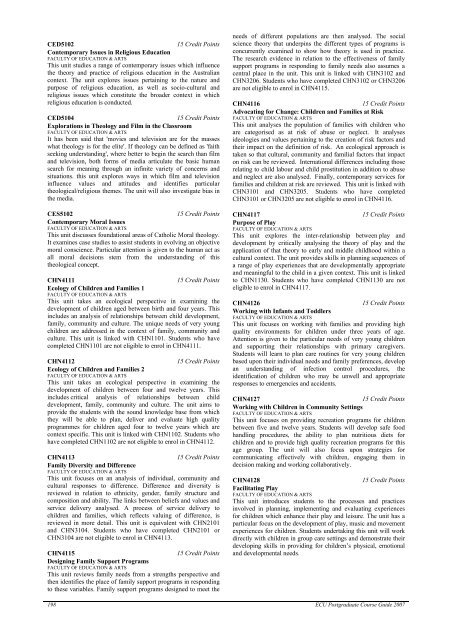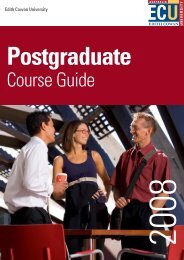Course Guide - Edith Cowan University
Course Guide - Edith Cowan University
Course Guide - Edith Cowan University
You also want an ePaper? Increase the reach of your titles
YUMPU automatically turns print PDFs into web optimized ePapers that Google loves.
CED5102<br />
15 Credit Points<br />
Contemporary Issues in Religious Education<br />
FACULTY OF EDUCATION & ARTS<br />
This unit studies a range of contemporary issues which influence<br />
the theory and practice of religious education in the Australian<br />
context. The unit explores issues pertaining to the nature and<br />
purpose of religious education, as well as socio-cultural and<br />
religious issues which constitute the broader context in which<br />
religious education is conducted.<br />
CED5104<br />
15 Credit Points<br />
Explorations in Theology and Film in the Classroom<br />
FACULTY OF EDUCATION & ARTS<br />
It has been said that 'movies and television are for the masses<br />
what theology is for the elite'. If theology can be defined as 'faith<br />
seeking understanding', where better to begin the search than film<br />
and television, both forms of media articulate the basic human<br />
search for meaning through an infinite variety of concerns and<br />
situations. this unit explores ways in which film and television<br />
influence values and attitudes and identifies particular<br />
theological/religious themes. The unit will also investigate bias in<br />
the media.<br />
CES5102<br />
15 Credit Points<br />
Contemporary Moral Issues<br />
FACULTY OF EDUCATION & ARTS<br />
This unit discusses foundational areas of Catholic Moral theology.<br />
It examines case studies to assist students in evolving an objective<br />
moral conscience. Particular attention is given to the human act as<br />
all moral decisions stem from the understanding of this<br />
theological concept.<br />
CHN4111<br />
15 Credit Points<br />
Ecology of Children and Families 1<br />
FACULTY OF EDUCATION & ARTS<br />
This unit takes an ecological perspective in examining the<br />
development of children aged between birth and four years. This<br />
includes an analysis of relationships between child development,<br />
family, community and culture. The unique needs of very young<br />
children are addressed in the context of family, community and<br />
culture. This unit is linked with CHN1101. Students who have<br />
completed CHN1101 are not eligible to enrol in CHN4111.<br />
CHN4112<br />
15 Credit Points<br />
Ecology of Children and Families 2<br />
FACULTY OF EDUCATION & ARTS<br />
This unit takes an ecological perspective in examining the<br />
development of children between four and twelve years. This<br />
includes critical analysis of relationships between child<br />
development, family, community and culture. The unit aims to<br />
provide the students with the sound knowledge base from which<br />
they will be able to plan, deliver and evaluate high quality<br />
programmes for children aged four to twelve years which are<br />
context specific. This unit is linked with CHN1102. Students who<br />
have completed CHN1102 are not eligible to enrol in CHN4112.<br />
CHN4113<br />
15 Credit Points<br />
Family Diversity and Difference<br />
FACULTY OF EDUCATION & ARTS<br />
This unit focuses on an analysis of individual, community and<br />
cultural responses to difference. Difference and diversity is<br />
reviewed in relation to ethnicity, gender, family structure and<br />
composition and ability. The links between beliefs and values and<br />
service delivery analysed. A process of service delivery to<br />
children and families, which reflects valuing of difference, is<br />
reviewed in more detail. This unit is equivalent with CHN2101<br />
and CHN3104. Students who have completed CHN2101 or<br />
CHN3104 are not eligible to enrol in CHN4113.<br />
CHN4115<br />
15 Credit Points<br />
Designing Family Support Programs<br />
FACULTY OF EDUCATION & ARTS<br />
This unit reviews family needs from a strengths perspective and<br />
then identifies the place of family support programs in responding<br />
to these variables. Family support programs designed to meet the<br />
needs of different populations are then analysed. The social<br />
science theory that underpins the different types of programs is<br />
concurrently examined to show how theory is used in practice.<br />
The research evidence in relation to the effectiveness of family<br />
support programs in responding to family needs also assumes a<br />
central place in the unit. This unit is linked with CHN3102 and<br />
CHN3206. Students who have completed CHN3102 or CHN3206<br />
are not eligible to enrol in CHN4115.<br />
CHN4116<br />
15 Credit Points<br />
Advocating for Change: Children and Families at Risk<br />
FACULTY OF EDUCATION & ARTS<br />
This unit analyses the population of families with children who<br />
are categorised as at risk of abuse or neglect. It analyses<br />
ideologies and values pertaining to the creation of risk factors and<br />
their impact on the definition of risk. An ecological approach is<br />
taken so that cultural, community and familial factors that impact<br />
on risk can be reviewed. International differences including those<br />
relating to child labour and child prostitution in addition to abuse<br />
and neglect are also analysed. Finally, contemporary services for<br />
families and children at risk are reviewed. This unit is linked with<br />
CHN3101 and CHN3205. Students who have completed<br />
CHN3101 or CHN3205 are not eligible to enrol in CHN4116.<br />
CHN4117<br />
15 Credit Points<br />
Purpose of Play<br />
FACULTY OF EDUCATION & ARTS<br />
This unit explores the inter-relationship between play and<br />
development by critically analysing the theory of play and the<br />
application of that theory to early and middle childhood within a<br />
cultural context. The unit provides skills in planning sequences of<br />
a range of play experiences that are developmentally appropriate<br />
and meaningful to the child in a given context. This unit is linked<br />
to CHN1130. Students who have completed CHN1130 are not<br />
eligible to enrol in CHN4117.<br />
CHN4126<br />
15 Credit Points<br />
Working with Infants and Toddlers<br />
FACULTY OF EDUCATION & ARTS<br />
This unit focuses on working with families and providing high<br />
quality environments for children under three years of age.<br />
Attention is given to the particular needs of very young children<br />
and supporting their relationships with primary caregivers.<br />
Students will learn to plan care routines for very young children<br />
based upon their individual needs and family preferences, develop<br />
an understanding of infection control procedures, the<br />
identification of children who may be unwell and appropriate<br />
responses to emergencies and accidents.<br />
CHN4127<br />
15 Credit Points<br />
Working with Children in Community Settings<br />
FACULTY OF EDUCATION & ARTS<br />
This unit focuses on providing recreation programs for children<br />
between five and twelve years. Students will develop safe food<br />
handling procedures, the ability to plan nutritious diets for<br />
children and to provide high quality recreation programs for this<br />
age group. The unit will also focus upon strategies for<br />
communicating effectively with children, engaging them in<br />
decision making and working collaboratively.<br />
CHN4128<br />
15 Credit Points<br />
Facilitating Play<br />
FACULTY OF EDUCATION & ARTS<br />
This unit introduces students to the processes and practices<br />
involved in planning, implementing and evaluating experiences<br />
for children which enhance their play and leisure. The unit has a<br />
particular focus on the development of play, music and movement<br />
experiences for children. Students undertaking this unit will work<br />
directly with children in group care settings and demonstrate their<br />
developing skills in providing for children’s physical, emotional<br />
and developmental needs.<br />
198 ECU Postgraduate <strong>Course</strong> <strong>Guide</strong> 2007



